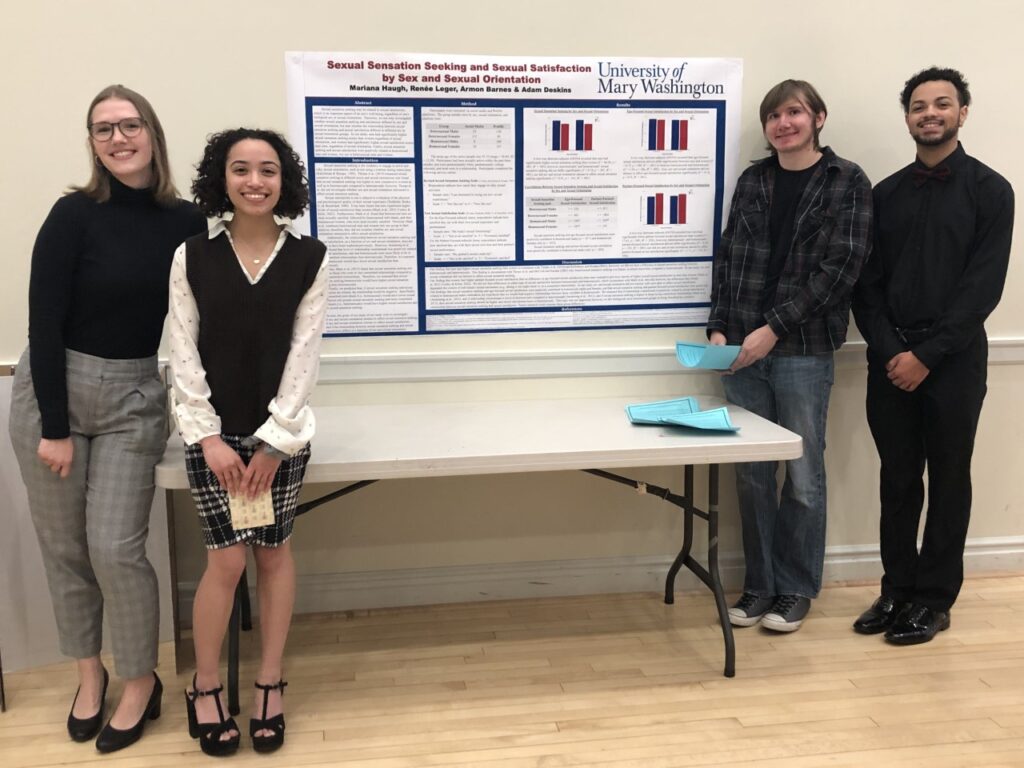Each year, advanced students in the department of Psychological Science break into research teams to pursue a year-long project under the mentorship of a faculty member. All of these research teams present the results of their projects either on campus, or at regional and national conferences, many present at more than one venue. This spring semester was no exception, as more than four dozen psychology majors presented their research at conferences in Washington D.C., Melborne, FL, Boston, MA, Alexandria, VA and in Fredericksburg.
In late February, over UMW’s spring break, Randi Ball and Maddy Gedney presented their research on how social media exposure impacts intended eating behaviors at the Eastern Psychological Association Annual Conference in Boston Massachusetts. Their faculty mentor is Dr. Chris McBride. The study they presented applied classic research on social influence and propaganda to the influence social media has on eating behavior. Specifically, they examined the impact of trustworthiness and credibility of a social media influencer by manipulating the follower count and credentials of the influencer in an experimental design. Key findings suggested that follower count and credentials of the influencers had no effect on level of trust and perceived credibility of an influencer—two key components of social influence. In addition, while variables such as the influencer’s age, likability, attractiveness, and trustworthiness did not predict eating intentions, higher levels of credibility was surprisingly associated with less interest in following the advice of the influencer.

At the end of March students Armon Barnes, Adam Deskins, Mariana Haugh and Renée Leger presented their project examining influences on sexual satisfaction by sex and sexual orientation at the UMW Women’s, Gender, and Sexuality Studies annual symposium, and took the top prize in the poster category. Their faculty mentor is Dr. Jennifer Mailloux. The students chose to investigate sexual satisfaction because it is an important influence on individuals’ general wellbeing as well as on the quality of their romantic relationships. This is true for all individuals, regardless of sex or sexual orientation. Using survey data, their project investigated influences on sexual satisfaction in homosexual females, homosexual males, heterosexual females, and heterosexual males. They will present again the end of May in Washington, D.C. at the Association for Psychological Science Annual Convention, along with three other student teams from UMW who will also present their research projects.

On April 13 and 14 the department will be taking 29 students and 7 faculty to the Virginia Association of Psychological Science conference in Alexandria, Virginia. While at that conference they will be presenting research conducted during their year-long research teams. Each team spent the year designing, implementing, analyzing, and writing up the results of their projects. Dr. Palmwood’s research team examined rumination and distress in individuals who have experienced a breakup from a significant romantic relationship, with the goal of identifying personal and relationship characteristics that can exacerbate or buffer against this distress. Dr. Schiffrin’s team examined whether the relationship between both maternal and paternal helicopter parenting and the outcomes of both disordered eating and academic burnout were potentially mediated by self-efficacy, self-control, and perfectionism. Dr. Mailloux’s team studied the relationship between non-sexual thoughts (e.g., thinking about one’s appearance, concerns about disease) on sexual satisfaction in both men and women as well as among people of a variety of different sexual orientation. Dr. Leppanen’s team studied how emotional context affects memory for previously retrieving information and he studied this using eye tracker technology. Dr. Stahlman’s team has been investigating how rats learn about similarities using landmarks in an open-air maze. The primary question is whether animals will treat two distinct landmarks as similar if they are predictive of the same food item in the same location. If animals see the landmarks as similar, then changing the food reward that one landmarks predicts should cause behavior toward a second to change, even in the absence of explicit training. Dr. Mackintosh’s team is doing a content analysis of children’s picture books to determine the prevalence and depiction of characters with disabilities. Students are coding for things like point of view, whether the children with disabilities are written as multidimensional characters, and the nature of their interactions with non-disabled characters. Finally, Dr. McBride’s team is looking at how peer and social media exposure to healthy and unhealthy eating affects subsequent food choices. On April 13th they will take a bus to Alexandria and have a dinner together to celebrate the work they have done. On the 14th they will present their research in front of students and faculty from across the state. The VAPS conference is an excellent opportunity to show people across the state the excellent research done by UMW students.
Finally, a long-standing departmental tradition, the Psi Chi Symposium, will be back on campus and in person on the last two days of classes, April 20 and 21. This symposium gives less experienced students the opportunity to present their class-based research, as well as for the seniors and juniors to report the results of their year-long work, and is a time for all to celebrate a great year of learning.
Leave a Reply